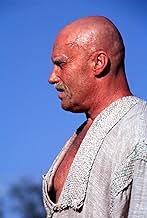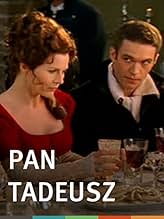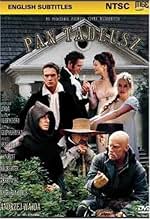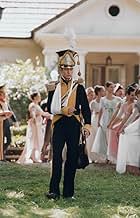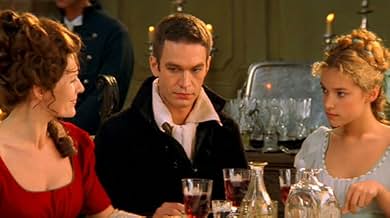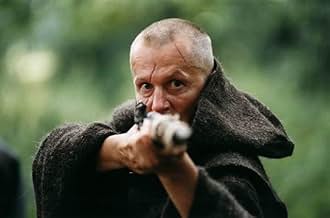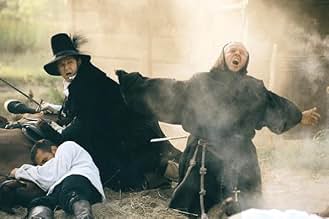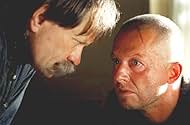Füge eine Handlung in deiner Sprache hinzuIn the early 1810s, Poles, part of Russia's client state of Lithuania, think independence will come if they join forces with Napoleon when he invades Russia. This unity of purpose, in one di... Alles lesenIn the early 1810s, Poles, part of Russia's client state of Lithuania, think independence will come if they join forces with Napoleon when he invades Russia. This unity of purpose, in one district, is undermined by two families, feuding since the head of one shot the head of the ... Alles lesenIn the early 1810s, Poles, part of Russia's client state of Lithuania, think independence will come if they join forces with Napoleon when he invades Russia. This unity of purpose, in one district, is undermined by two families, feuding since the head of one shot the head of the other twenty years before. There are hopes of a reconciliation through a marriage of Pan T... Alles lesen
- Auszeichnungen
- 7 Gewinne & 5 Nominierungen insgesamt
- Zosia Horeszkówna
- (as Alicja Bachleda-Curus)
- Rykow
- (as Siergiej Szakurow)
Empfohlene Bewertungen
First of all, the screen play was created in a very unusual way. The dialogs were not written, but extracted from the poem, some of them being full rhyming lines and some only parts. Of course most of the meaningful and informative pieces were in the narrative section of the poem and somehow didn't make it to the screen. I'm all for "show not tell", but "don't show, don't tell, everybody knows it all from school" is not the top shelf of movie-making to me.
All that is shown is pretty people, pretty costumes, pretty interiors, pretty nature. Definitely pleasant to see for anyone who likes pictures with historical settings and would like to get to know something about the life in a particular time and place.
The movie really works only for people who have read the poem and have been taught about its historical background. After such preparation they can enjoy this multimedia reconstruction of the characters and places from the book, because that's rather what it is to me. Indeed, all the actors are good, music memorable and all the details nicely done, but this production really lacks the cinematic backbone and something that would allow it to be a movie on its own.
We can expect high popularity level in Lithuania, and, maybe, to some extent in Belarus. But otherwise, the movie will be overlooked and probably discarded by the people who are not familiar with the history of the region, namely, with the Grand Duchy of Lithuania and the union with Recz Pospolita (The Polish-Lithuanian Commonwealth).
For Poles, Lithuanians, Belarusians this is a movie that brings back poignant nostalgia for the glorious past of the Duchy. For everyone else, it is just another historical ballad, based on the classical poem of Adam Mickiewicz.
The director, Andrzej Wajda, did a wonderful job -- the casting seems almost perfect, the whole organization is very nice, the acting is powerful. Some Polish movie critics predict that the film is going to be nominated for Oscar, but as far as it looks now, it is going to be huge -- but only on a regional scale.
The dialogue is drawn directly from the poem so it is in rhyming couplets. The acting styles and set design marvelously match the romantic, expressive language. The poem was published in 1834 and Adam Miczkiewicz was, I understand, influenced by Walter Scott. The English subtitles fail the film badly. They should have taken the risk of using a translation in a similar style. Unfortunately, for a non-Polish speaking person, I expect it is like watching Shakespeare translated into the language of the evening news. It looks terrific but a lot of the richness is missed.
The actors are mainly well-known faces in Polish cinema and yet all rise above the stereotypical images many of the audience have of them. The greatest example of this is Boguslaw Linda as Robak the Priest. In the most moving scene in the film he gives the performance of his life.
The harmonious blend of Wajda's direction and Wojciech Kilar's score is a sensual feast. It is a film which impresses a profound sense of beauty to such an extent that one could appreciate the sheer art of the film without even having to understand the language (I cannot vouch for the quality of the sub-titles in English as I saw it in its original version).
If you only see one foreign language film this year, make sure it is this one.
Excellent movie! Wajda has done an excellent job. Wajda is indeed the world's greatest movie director. Congratulations to Wajda on the Oscar you deserve it more than anyone else.
Wusstest du schon
- WissenswertesA polonaise composed by Kilar for this soundtrack gained a nation-wide recognition and became the opening tune for most high school proms. Before the movie the first dance was traditionally accompanied by Chopin.
- VerbindungenReferenced in Poranek kojota (2001)
Top-Auswahl
- How long is Pan Tadeusz: The Last Foray in Lithuania?Powered by Alexa
Details
- Erscheinungsdatum
- Herkunftsländer
- Sprache
- Auch bekannt als
- Pan Tadeusz: The Last Foray in Lithuania
- Drehorte
- Oporów, Lódzkie, Polen(castle)
- Produktionsfirmen
- Weitere beteiligte Unternehmen bei IMDbPro anzeigen
Box Office
- Budget
- 12.500.000 PLN (geschätzt)
- Laufzeit2 Stunden 27 Minuten
- Farbe
- Sound-Mix
- Seitenverhältnis
- 2.35 : 1
Zu dieser Seite beitragen


